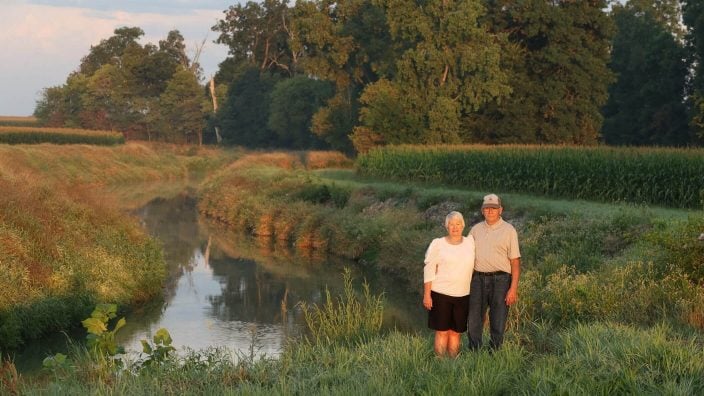Ohio House passes two Farm Bureau-supported bills
The bills address the shortage of career tech educators and the nuisance issue of feral swine.
Read MoreWhen Ohio landowners are faced with losing property rights through eminent domain, the law doesn’t make it easy for them to defend their own interests.
When Ohio landowners are faced with losing property rights through eminent domain, the law doesn’t make it easy for them to defend their own interests. Even though the Ohio Legislature overhauled eminent domain law back in 2007, landowners often remain at a disadvantage, explained Leah Curtis, policy counsel for Ohio Farm Bureau. “There continue to be challenges for property owners.”
Landowners like David and Rita Suhr have seen how complicated it can be to get fair compensation when property rights are taken. They own farmland in Mercer County along Beaver Creek that started flooding after the Ohio Department of Natural Resources redesigned and expanded a spillway for Grand Lake in 1997. They and dozens of other property owners along Beaver Creek and the Wabash River saw their property values dwindle due to repeated flooding. At the time, the Suhrs were farming some of their land and cash renting the rest, David said. They’ve since retired from farming and rent out all of the ground, but the yield losses due to flooding are still affecting their income.
“If it never flooded at all, I’d get a higher cash rent,” he said.
Although the Suhrs and other affected property owners had evidence of the damage to their properties, getting compensation from the state required a complicated series of lawsuits and appeals.
“It drug on for nine or 10 years,” David said.
The Grand Lake situation illustrates one of the weaknesses in Ohio’s eminent domain law, Curtis said. The landowners had to sue the state to ask for compensation after the damage was done.
“The government refused to recognize that as a taking,” she said.
Nearly every other state has a more direct legal route for a landowner to receive compensation when property value is damaged. This type of court action is called inverse condemnation. In most states, when a property owner files such a case in court, the court starts by determining if there was indeed a taking of land or property value and if the owner is owed compensation. If so, the same court handles the trial to set the amount of compensation to the landowner.
In Ohio, the process is much more complicated, requiring the involvement of separate courts to evaluate whether a taking has occurred and what the compensation should be. As a result, getting compensation becomes a long, complex process.
Tom Fusonie, an attorney with Vorys, Sater, Seymour and Pease LLP, worked with some of the landowners on their Grand Lake inverse condemnation cases. In cases like this, Ohio property owners have to start by filing a writ to ask the court to order the entity that took the property to go through the eminent domain process, he said. And they must prove the taking by “clear and convincing evidence,” a much higher legal standard than the “preponderance of evidence” required in other states.
In the Grand Lake cases and other Ohio inverse condemnation cases, the state or entity that took the property has little incentive to resolve cases quickly, Fusonie said. Utility companies with deep pockets and government attorneys paid through tax dollars can afford to file repeated appeals. Meanwhile property owners, even if they win their cases, can’t recover attorney fees, he noted.
“How are you going to fight through all the stages without the chance of getting attorney fees?” Fusonie said.
As a result, property owners often can’t justify taking inverse condemnation cases to court if the taking is relatively small or the cost for attorneys would exceed any compensation, Fusonie said. For instance, say the Ohio Department of Transportation took land through eminent domain to widen a road, but the construction actually extended a little beyond the property the landowner was compensated for. Maybe the landowner is owed only a few thousand dollars, but ODOT has little incentive to pay it, knowing the landowner can’t justify the cost to sue. Situations like this take away rights from landowners, especially those without the resources to sue, Fusonie said.
“If you’re not rich, that fundamental right is relegated to the margins.”
Another change needed in Ohio law deals with the way eminent domain cases move through the court system. Farm Bureau has been involved with a couple of recent cases in which courts have tried to move forward with just compensation trials when the landowners were still in the process of appealing the use of eminent domain in the first place.
For example, a case in Pickaway County involved land owned by Farm Bureau members who appealed the use of eminent domain by Columbia Gas. The company wanted to get access to the land to put in a pipeline that would supply gas to a paper manufacturer. The landowners initially appealed the use of eminent domain on the property, arguing that supplying gas to a single industrial customer did not meet the public need and necessity requirements for eminent domain.
Even though the appeal of eminent domain was still pending, the court was moving forward on determining compensation. There are several problems with that course of action, Curtis said. Jumping ahead to determine compensation seems to assume that eminent domain is justified, when that has not yet been determined. For landowners, it increases the cost of protecting their own interests since they are trying to appeal eminent domain action while also fighting for fair compensation. The court system also could end up spending time and resources figuring out compensation when eminent domain might not even be justified.
To keep the compensation case from moving forward, the landowners filed a writ of prohibition with the Ohio Supreme Court and the Supreme Court issued a stay, preventing the lower court judge from moving forward to determine compensation. Eventually, the landowners and Columbia Gas came to an agreement on the use of the land so the cases related to eminent domain were dropped. Even so, the Supreme Court’s action on the compensation case highlights a weakness in current state law.
Currently, Ohio law directs courts to move forward promptly with compensation trials to avoid delays in the process. At the same time, the law notes that compensation trials are subject to appeal, Curtis said. Even though the Ohio Supreme Court has indicated that courts can’t proceed on compensation until appeals are settled, adding more specific language in the law could help head off court cases revisiting the same situation in the future.
Farm Bureau would also like to see changes in how state law identifies public use and what qualifies as public “need and necessity,” Curtis said. For instance, it should be clear that courts have the ability to review rulings made by the Public Utilities Commission of Ohio. PUCO approval of a project should not be seen as “irrefutable presumption” that the utility has eminent domain authority, she said. “We want to make sure landowners have the opportunity to be a part of the process.”
Online Extra: New eminent domain legislation supported by Ohio Farm Bureau aims to reform the law and help protect landowners.
CAPTION: Mercer County Farm Bureau members David and Rita Suhr are pictured on their farmland along Beaver Creek. Photo by David Liggett.
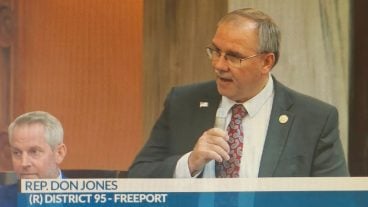
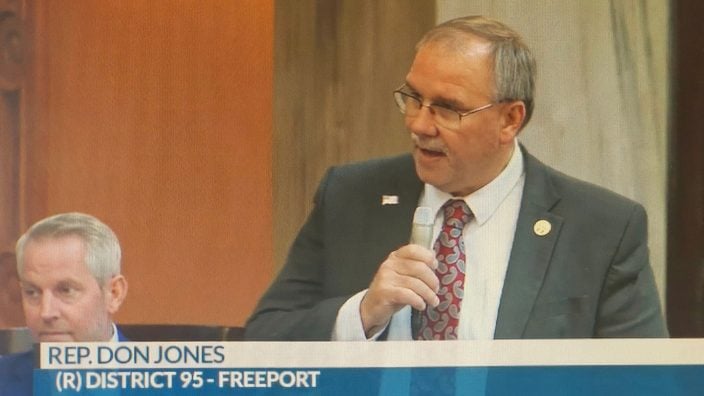
The bills address the shortage of career tech educators and the nuisance issue of feral swine.
Read More
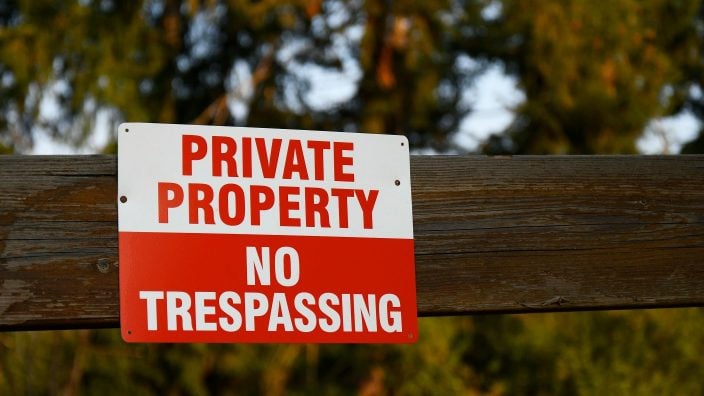
Policy Counsel Leah Curtis discusses Ohio trespassing laws and the liability that can fall on landowners when people enter their property.
Read More

The 3rd District Court of Appeals ruled that Columbia Gas of Ohio did not demonstrate that taking of the property was a necessity, and that further review was warranted of the agricultural easement issue.
Read More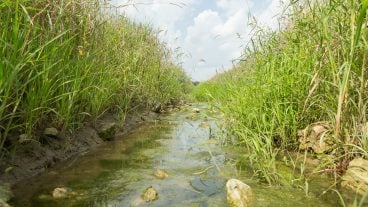
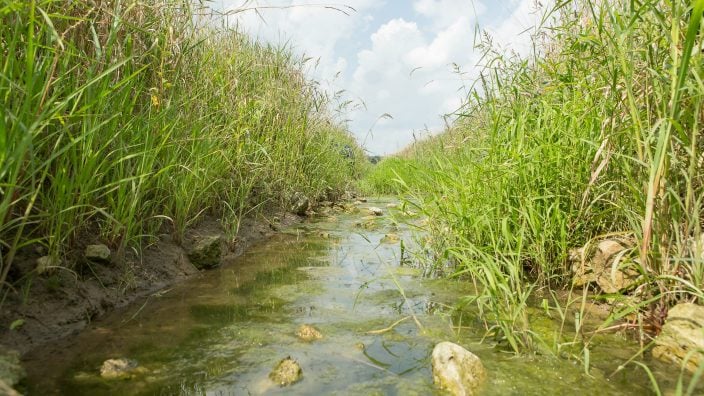
A second U.S. District Court ruled to halt the 2023 Waters of the United States rule. This ruling stops implementation of the rule in 24 states, including Ohio.
Read More

In addition to the testimony in support of HB 64, Ohio Farm Bureau is asking members to contact their state representative to voice their support for eminent domain reform.
Read More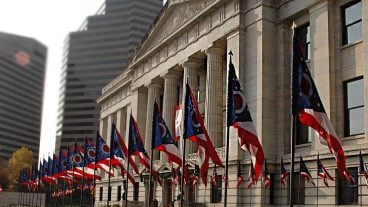
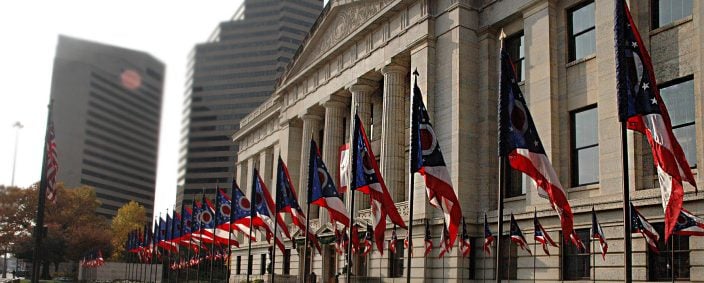
A bill introduced by State Representatives Darrell Kick and Rodney Creech would create a more direct legal route for a landowner to receive compensation when property is taken by the government without compensation.
Read More

The 2023 Ohio Agriculture and Rural Communities Action plan provides a blueprint for policymakers and Ohio Farm Bureau members to bolster Ohio’s agriculture industry and our rural communities.
Read More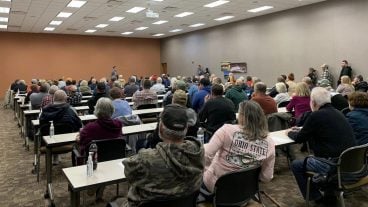
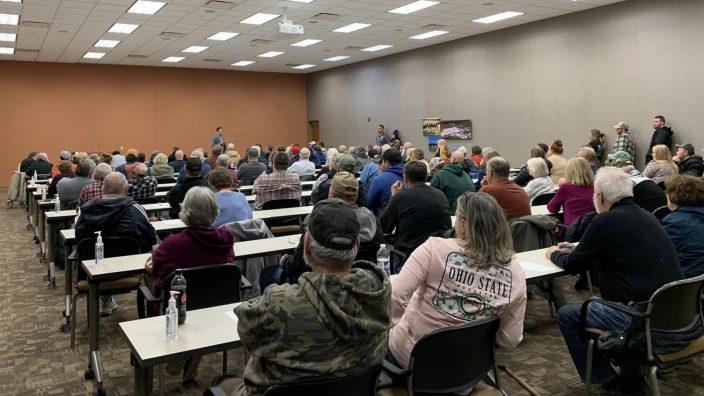
During the meeting, participants received an update on solar development in the county and were given the opportunity to ask questions to Commissioner Wallace.
Read More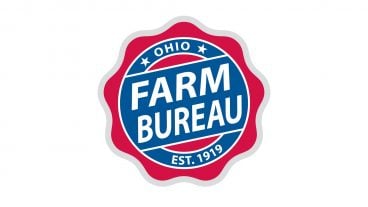
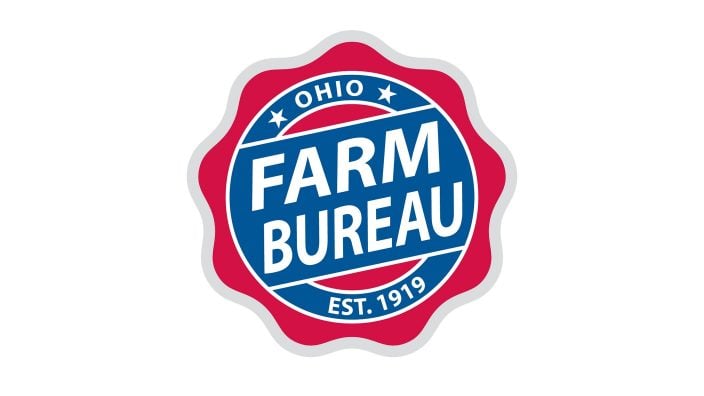
Farm Bureau advocates for agriculture in big and small ways – from fighting for priority issues such as landowner property rights and the next farm bill, to educating members about the need to study solar leases carefully.
Read More

The Ohio Landowner Hunter Access Partnership provides annual payments to landowners for providing hunting access to their property.
Read More